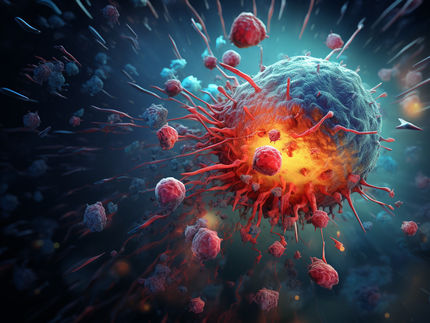Flexible, Stable and Potent Against Cancer
New approach to tumor treatment
Linking therapeutically active molecules to specific antibodies can help to pilot them to their designated targets and minimize side effects—especially when treating tumors. In the journal Angewandte Chemie, scientists have now described novel conjugates made from antibodies and a kinesin spindle protein inhibitor. Changing the linker between the two components allows for tuning the activity of this cytostatic drug, which is effective against a broad palette of cancers.

© Wiley-VCH
Medications need to be highly effective, but relatively free of side effects. This is particularly important in cancer treatment, because the cytostatic drugs used interfere with the regulation mechanisms of all cells in the body, causing symptoms like impairment of immune defences, hair loss, and nausea. Treatments therefore aim to introduce cytostatic drugs directly into tumor cells before triggering their toxic effect. One of the ways to achieve this is to attach such small drug molecules to an antibody to make a conjugate. The bridging component, called the linker, must hold the conjugate together for as long as it circulates in the blood. The antibody binds specifically to binding sites (antigens) that are especially numerous on the surfaces of targeted tumor cells. Docking of the antibody triggers uptake of the conjugate inside the cancer cells. There, the drug is released by enzymes to carry out its destructive task specifically on the cancer cell. Healthy cells remain largely unmolested.
The number of cytostatic drugs that have been successfully incorporated into such antibody conjugates has so far been limited. Researchers led by Hans-Georg Lerchen (Bayer AG) have now tried this with a cytotoxin that uses a different mechanism than classic cytostatic drugs for attacking the cell cycle. It is a novel pyrrole-based kinesin spindle protein (KSP) inhibitor. KSP plays a key role in centrosome separation during cell division. Blocking this step causes a strong antitumor effect. Even very low doses of the inhibitor were highly effective against a broad palette of cancer cell lines. Lerchen and his co-workers have demonstrated that this technique can be used to make highly active antibody conjugates. Use of different antibodies allows them to target a variety of types of tumor.
The researchers were able to connect the inhibitor at a variety of attachment points by stabile linkers to the antibody thereby hindering premature splitting. Only inside the tumor cells, the conjugates are metabolized by enzymes, releasing the inhibitor. Variation of the linker allows for controlled variation of the resulting inhibitor molecules so that their activity can be tailored to specific requirements. Inhibitors that cannot be expelled from the cells accumulate in the tumor cells, lengthening their active period. Inhibitors that can be expelled may enter neighboring tumor cells, which is especially useful in the treatment of tumors that contain a heterogenic pattern of antibody binding sites.
The new conjugates are highly effective in vitro and were shown to be effective in tumor models for various indications in vivo. In experiments with mice they led to complete remission of a human bladder tumor model—with minimal side effects.
Original publication
Other news from the department science
Most read news
More news from our other portals
See the theme worlds for related content
Topic world Antibodies
Antibodies are specialized molecules of our immune system that can specifically recognize and neutralize pathogens or foreign substances. Antibody research in biotech and pharma has recognized this natural defense potential and is working intensively to make it therapeutically useful. From monoclonal antibodies used against cancer or autoimmune diseases to antibody-drug conjugates that specifically transport drugs to disease cells - the possibilities are enormous

Topic world Antibodies
Antibodies are specialized molecules of our immune system that can specifically recognize and neutralize pathogens or foreign substances. Antibody research in biotech and pharma has recognized this natural defense potential and is working intensively to make it therapeutically useful. From monoclonal antibodies used against cancer or autoimmune diseases to antibody-drug conjugates that specifically transport drugs to disease cells - the possibilities are enormous



















































